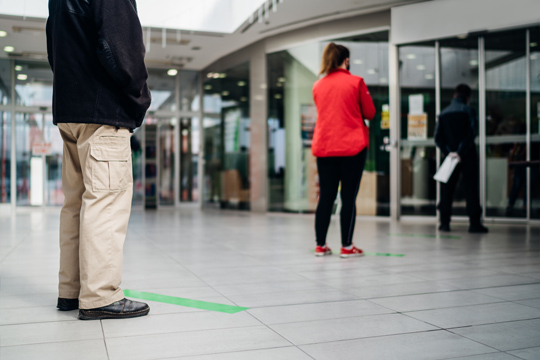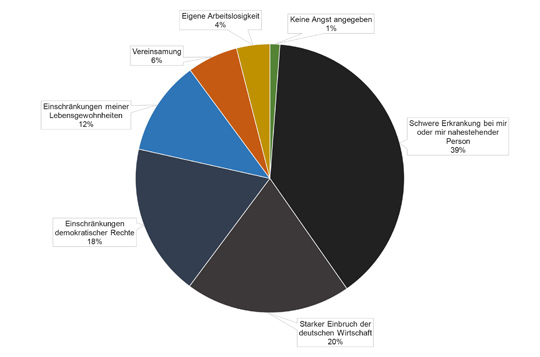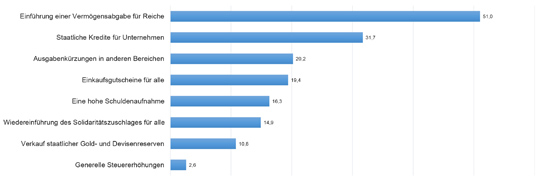Trust in the government and the media
Freiburg, Jun 04, 2020
Before the coronavirus, everything seemed possible. We could travel, go to restaurants or to the movies, and naturally greet people with a handshake. But since the virus has emerged in the world, a state of emergency is the new normal. And even that is constantly changing depending on infection and reproduction rates. Researchers at the University of Freiburg, the Ludwig-Maximilian-Universität Munich and the University of Stuttgart are currently carrying out online surveys to find out how people are coping with the virus. The panel survey, according to the plan, will run for one year with four installments. In each installment, the same people will be interviewed, making it possible to analyze individual changes in attitude patterns over time. The first installment, which took place May 7-17, 2020, has already revealed exciting details, including the fact that the majority of Germans do not consider the measures to contain Sars-CoV-2 to be exaggerated in any way.

Health fears, economic burden, but confidence in government measures: that’s one significant result of the survey. Photo: eldarnurkovic/stock.adobe.com
Health fears, economic burden, but confidence in government measures: At the University of Freiburg, Prof. Dr. Uwe Wagschal and Dr. Sebastian Jäckle from the Department of Political Science are leading a nationwide survey to find out over four time periods how people are dealing with the pandemic situation. Together with teams from the universities in Munich and Stuttgart, the political scientists from Freiburg have drawn up the questionnaire, explains Wagschal: “Thematically, however, each team has set its own priorities. For example, we focused on economic and health issues.”
Almost 8,000 people are taking part in the survey. The researchers recruited a large proportion of the respondents from the German political panel that Wagschal has been organizing since the 2017 federal elections. The researchers found further participants via social media channels and regional newspapers, which drew attention to the survey. Wagschal and Jäckle are very happy with the number of participants. For an online survey, the number is high, and the distribution of participants by age, gender and party affiliation corresponds comparatively well to that of the electorate. According to Jäckle, the online platform also has many survey advantages, including the fact that questions that make sense can be answered using visual comparison options such as several sliders. “This allows you to ask questions that would not be possible in a telephone interview.”
Fears due to the virus
Almost everyone seems to have realized that the virus is anything but harmless - in terms of health, but also economically and socially. 39 percent are afraid of serious illness for themselves or people close to them. 20 percent of those surveyed are afraid of a severe economic slump, 18 percent are afraid of having fewer democratic rights and 12 percent are afraid of having to restrict their lifestyle. Hardly anyone can escape the virus without fear. Only one percent indicated "no fear" in the survey. However, people are not equally affected everywhere. Rather, there are regions with high levels of perceived exposure and those with lower levels. It is interesting to note that the burden is not necessarily related to the Covid-19 case numbers. People in Central Franconia and Saxony-Anhalt, for example, feel much more burdened than in the south of Bavaria or in Baden-Württemberg, where the infection rates and deaths were much higher.
 Participants' answers to the question of what they fear most about the pandemic.
Participants' answers to the question of what they fear most about the pandemic.
Source: Politikpanel Deutschland
(click to enlarge)
Differentiated approval
Political scientist Wagschal says he was personally surprised that almost 60 percent of those surveyed agreed with the government measures to combat the virus. Of course there are also corona protests, but these have been less conspicuous by their mass appeal than by their media presence. Only 22 percent of those questioned considered the corona rules to be “not suitable.” And 17.1 percent said “partly, partly.” It is also interesting to see how differentiated people in Germany evaluated the measures during the survey period: Border closures were considered appropriate by 69.4 percent, the closure of daycare centers and schools by 66 percent and contact restrictions outside the home by 64 percent. What was less well received by the population was the immunity identity card for people who have survived the disease, which has since been proposed by Health Minister Jens Spahn. This only managed to get 32.7 percent approval.
However, the figures reveal even more, including how differently the political milieus evaluate the state measures to combat the virus. Before Wagschal goes into detail, he speaks of an “unusual polarization.” It is considered unusual because the FDP has fallen out of the ranks of the established parties. Of the FDP supporters, 51.8 percent are critical of the measures, compared to 73.5 percent of the AfD. Among the other parties, those who are dissatisfied belong to the minority: 14.7 percent of the Green Party supporters, 12.2 percent of the CDU/CSU and 11.8 percent of the SPD. And even among those on the left, critics of the measures are only about a fifth. The two political scientists explain the fact that the FDP supporters have moved away from the center with the party’s economic liberal position. “Their electorate includes many self-employed and freelance workers, who have experienced severe economic restrictions due to the anti-Corona measures.”
Capital levy on the rich
However, an economic response to the virus must also be made. But how? The researchers have also asked this question. More than half of the respondents, 51 percent, suggested that the rich should be asked to pay a capital levy. As a further package of measures, they named “state loans,” cuts in expenditure and shopping vouchers for everyone. What Wagschal does not understand is why the sale of state gold reserves meets with so little approval, hovering at only 10.8 percent. In other countries, Switzerland for example, surplus gold reserves have long been sold. “So why not here?” After all, reserves are formed to be able to access them in times of crisis. Another interesting detail to which the two political scientists have drawn attention is the unsurprising fact that around 30% of those surveyed stated that since the corona crisis, they have had to get by with less money. But there are also the others. Those who benefit financially from the virus - and that is 10 percent.

Participants' answers to the question of which measures they consider appropriate to combat the economic consequences of the corona pandemic in Germany.
Source: Politikpanel Deutschland
(click to enlarge)
Various sources of information
Both Wagschal and Jäckle are curious to see how the next three interview installments will turn out. “Compared to other countries, we have come through the crisis comparatively well so far,” emphasizes Jäckle. The institutional system has reacted quickly and well. The large masses still have confidence in the government and the media. But here, too, there are differences. While supporters of the CDU/CSU as well as the SPD and Greens trust mainly newspapers, public media and the official websites of the Robert Koch Institute or the Federal Ministry of Health, trust in all sources of information is very weak among AfD supporters or protesters such as the newly founded group “Widerstand 2020” (Resistance 2020). They are most likely to trust social media and Internet blogs, and thus precisely those sources that the vast majority of the population considers to be particularly untrustworthy. “It is important that politics continues to take people along on their way through the crisis,” says Jäckle. “Because if there is a lack of trust, people become susceptible to fake news.”
Stephanie Streif

